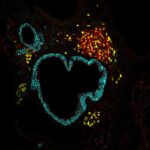
Publication: Broad, intense anti-human immunodeficiency virus (HIV) ex vivo CD8(+) responses in HIV type 1-infected patients: comparison with anti-Epstein-Barr virus responses and changes during antiretroviral therapy.
Publié dans: J Virol 1999 Sep; 73(9): 7108-16
Auteurs: Dalod M, Dupuis M, Deschemin JC, Sicard D, Salmon D, Delfraissy JF, Venet A, Sinet M, Guillet JG
Résumé
The ex vivo antiviral CD8(+) repertoires of 34 human immunodeficiency virus (HIV)-seropositive patients with various CD4(+) T-cell counts and virus loads were analyzed by gamma interferon enzyme-linked immunospot assay, using peptides derived from HIV type 1 and Epstein-Barr virus (EBV). Most patients recognized many HIV peptides, with markedly high frequencies, in association with all the HLA class I molecules tested. We found no correlation between the intensity of anti-HIV CD8(+) responses and the CD4(+) counts or virus load. In contrast, the polyclonality of anti-HIV CD8(+) responses was positively correlated with the CD4(+) counts. The anti-EBV responses were significantly less intense than the anti-HIV responses and were positively correlated with the CD4(+) counts. Longitudinal follow-up of several patients revealed the remarkable stability of the anti-HIV and anti-EBV CD8(+) responses in two patients with stable CD4(+) counts, while both antiviral responses decreased in two patients with obvious progression toward disease. Last, highly active antiretroviral therapy induced marked decreases in the number of anti-HIV CD8(+) T cells, while the anti-EBV responses increased. These findings emphasize the magnitude of the ex vivo HIV-specific CD8(+) responses at all stages of HIV infection and suggest that the CD8(+) hyperlymphocytosis commonly observed in HIV infection is driven mainly by virus replication, through intense, continuous activation of HIV-specific CD8(+) T cells until ultimate progression toward disease. Nevertheless, highly polyclonal anti-HIV CD8(+) responses may be associated with a better clinical status. Our data also suggest that a decrease of anti-EBV CD8(+) responses may occur with depletion of CD4(+) T cells, but this could be restored by highly active antiretroviral treatment.
Lien vers Pubmed [PMID] – 10438796

